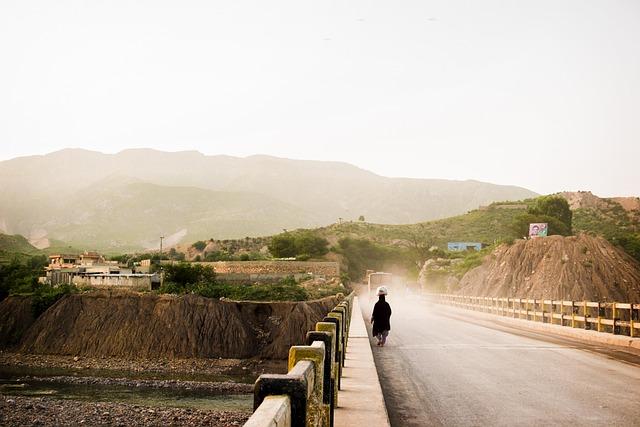In the tapestry of human experience, resilience often emerges as the thread that binds communities in the face of adversity. Nowhere is this more evident than in Pakistan, a nation shaped by both its triumphs and tribulations. For years, Pakistan has wrestled with the pervasive shadows of terrorism, navigating a landscape often marred by violence and upheaval. Yet amid the turmoil, a profound story of endurance unfolds—one that showcases the unyielding spirit of its people. This article delves into the multifaceted fight against terror in Pakistan, exploring how resilience has not only defined the response to adversity but has also galvanized a nation towards solidarity, recovery, and hope. As we peel back the layers of this complex narrative, it becomes evident that the struggle against terror is not merely a battle of security but also a testament to the strength of human resolve in the face of profound challenges.
Understanding the Historical Context of Terrorism in Pakistan
The historical context of terrorism in Pakistan can be traced through the intricate tapestry of its socio-political landscape. The evolution of militant activities in the region is heavily influenced by a multitude of factors, including geopolitical dynamics, ideological extremism, and socio-economic disparities. Key elements contributing to the rise of terrorism include:
- Geopolitical Influence: The Cold War and subsequent U.S.-Pakistan relations laid the groundwork for various militant groups, especially during the Afghan-Soviet War.
- Religious Extremism: The proliferation of sectarian violence and the rise of radical ideologies have fueled a culture of militant activism.
- Socio-Economic Factors: Poverty and lack of education have created fertile grounds for recruitment by extremist organizations.
Throughout its tumultuous history, Pakistan has encountered numerous factions vying for dominance, leading to a complex web of alliances and enmities. The shifting landscapes of terrorism reveal a repeated cycle of violence that has profoundly affected national security and societal norms. A clear understanding of these factors can be illustrated in the following table:
| Period | Key Events | Impact on Terrorism |
|---|---|---|
| 1980s | Soviet-Afghan War | Emergence of jihadist groups |
| 1990s | Rise of sectarian violence | Increase in domestic terrorism |
| 2001 | 9/11 Attacks | Global war on terror initiated |
| 2007-Present | Militancy in tribal areas | Escalation of insurgent activities |

Community Empowerment and the Role of Grassroots Movements
In the wake of adversity, communities in Pakistan have exhibited remarkable resilience, fueled by the power of grassroots movements. These localized efforts have become vital in mobilizing citizens, fostering unity, and developing strategies that address not only the immediate impacts of terrorism but also the underlying social issues. By organizing peaceful protests, community dialogues, and educational workshops, citizens have been able to reclaim their narratives and reshape public discourse. This organic mobilization has empowered individuals to actively participate in decision-making processes that directly affect their lives, thus bridging the gap between the community and governance.
Grassroots movements in Pakistan are often characterized by their ability to harness local resources and knowledge, creating frameworks that resonate with the cultural and social fabric of the communities they serve. The following elements are crucial in enhancing community empowerment:
- Education and Awareness: Providing information about rights and available resources enables community members to advocate for themselves.
- Networking and Coalition Building: Collaborations among diverse groups strengthen collective bargaining and influence policy changes.
- Capacity Development: Training sessions equip individuals with skills necessary to lead local initiatives effectively.
Moreover, grassroots movements have not only contributed to immediate community resilience but have also laid the foundation for long-term social change. By creating platforms that facilitate dialogue and promote solidarity, these initiatives encourage diverse voices and perspectives to flourish. For a clearer understanding of the impact of these movements, consider the following table illustrating key successes of grassroots movements in Pakistan:
| Initiative | Impact |
|---|---|
| Community Safety Patrols | Reduction in local crime rates and increased public trust. |
| Awareness Campaigns | Improved education on human rights and civic duties. |
| Art and Culture Programs | Reinforcement of cultural identity and community spirit. |

Strengthening Institutional Frameworks for National Security
To effectively combat the multifaceted challenges of terrorism, it is essential to enhance the institutional frameworks that define national security strategy. This involves a thorough analysis of existing security measures, identifying vulnerabilities, and implementing necessary reforms. By fostering a culture of collaboration among security agencies, the government can ensure that information flows seamlessly across departments. Key measures include:
- Enhanced Training Programs: Ongoing professional development for security personnel is crucial in adapting to new threats.
- Public-Private Partnerships: Engaging the private sector can provide additional resources and innovative solutions to counter-terrorism efforts.
- Community Engagement: Building trust and rapport within local communities can lead to more effective intelligence-gathering and preventive measures.
Furthermore, the integration of modern technology into the national security apparatus plays a pivotal role in strengthening response capabilities. This may include the deployment of advanced surveillance systems, data analytics for threat assessment, and cyber security measures to safeguard national infrastructure. A structured approach ensures the systematic enhancement of resources and tools available for security forces. An overview of the strategic enhancements can be summarized in the following table:
| Strategy | Description |
|---|---|
| Training | Regular workshops for skill enhancement. |
| Collaboration | Joint operations across agencies and with communities. |
| Technology | Utilizing AI and data analytics for better predictions. |
| Legislation | Updating laws to address evolving threats. |

Cultivating a Culture of Resilience through Education and Awareness
In the heart of a nation grappling with the shadows of conflict, education emerges as a beacon of hope and a catalyst for transformation. By prioritizing awareness and understanding, Pakistani communities can foster an environment where resilience flourishes. Schools and educational institutions are pivotal in this initiative, serving not just as centers of learning but as platforms for cultivating critical thinking and social cohesion. Through programs that emphasize the principles of peace, coexistence, and the significance of mental health, young minds can be armed with the tools needed to navigate the complexities of their surroundings. This proactive approach encourages the development of emotional intelligence and promotes a strong sense of community responsibility among students, enabling them to stand firm in the face of adversity.
Moreover, cultivating a culture of resilience is not confined to formal education; it extends into community initiatives and public dialogues. Grassroots movements that engage with local populations amplify the message of resilience and promote a shared sense of purpose. Initiatives such as workshops, seminars, and cultural events highlight the stories of triumph over adversity, creating relatable narratives that inspire and empower individuals. To illustrate the importance of collective effort, a brief overview of successful community-led resilience projects across the country can be insightful:
| Project Name | Location | Focus Area |
|---|---|---|
| Peace Through Poetry | Karachi | Art and Expression |
| Resilience Workshops | Lahore | Mental Health |
| Community Unity Festivals | Peshawar | Social Cohesion |
These projects are a testament to the power of grassroots movements in building understanding and fostering resilience in the community. By engaging people actively and integrating educational frameworks, Pakistan continues to transform its narrative from one of fear to one of strength and perseverance.
In Summary
In the tapestry of nations, Pakistan’s narrative is woven with threads of strength and vulnerability, of hardship and hope. The fight against terror has not merely been a battle against external threats but a profound struggle that has shaped the very soul of the country. With each challenge faced, a resilient spirit has emerged, echoing tales of sacrifice and perseverance. As Pakistan continues to navigate this complex landscape, it stands at a crossroads—challenged, yet unyielding, and determined to forge a future grounded in peace and stability. The road ahead may be fraught with difficulties, but the lessons learned in adversity serve as the foundation for a resilient tomorrow. it is the unwavering spirit of its people that will illuminate the path forward, reminding us all that even in the darkest times, the light of resilience can pave the way for enduring change.



